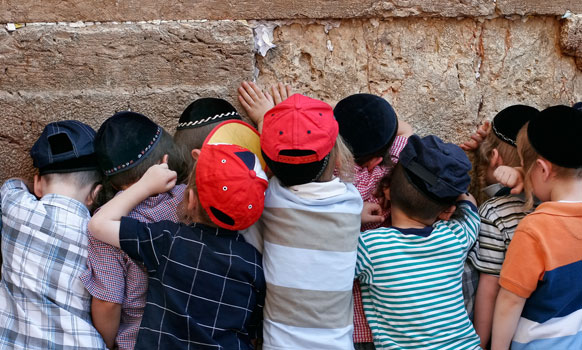
How Developing Spiritual Grit Can Help Us Respond To Coronavirus (COVID-19)
What seemed like someone else’s problem, tucked away in a corner of East Asia several weeks ago, suddenly, and in a matter of days, has taken a drastic turn and come to our shores. Yesterday the WHO declared the Coronavirus a pandemic, and in an instant, so much of the stability and security that many Americans and Westerners have always taken for granted is uprooted. All major sports leagues have shut down for the season, as has Broadway, Disney and countless other iconic tourist spots. We were afraid of the economic downturn a week or two ago, but as the virus continues to spread, more basic worries like “How far will this go?” “Will we overwhelm our hospitals?” “When will life return to normal?” have become the more pressing questions.
While 9/11 was a time of unity and a catastrophic moment in history that was on many people’s minds, even that was not like Covid-19. While it is terrifying and anxiety-inducing, how incredible is it that for the first time in our lives, we are all going through something together – as a planet. We cannot just callously say “that is someone else’s problem tucked away in a corner of the world I can’t see.” We can all feel the imminence of this virus. Whenever we encounter anyone – from a stranger we never met to a close relative we speak to constantly – we instantly know what is on their mind. Corona, corona, corona.
Not only does this terror remove our stability and its ubiquity unify us, it is a great equalizer as well. Tom Hanks has it. As does an NBA player, as do many world leaders. For all that we have done in our lives – all that we accomplished, worked for, or inherited, Covid-19 doesn’t care or discriminate. We are all equally vulnerable to catching it, and while it does have a higher mortality rate for the old and infirmed, it also randomly kills young people. So no one is safe. And while we’d never in a million years ask for a test like this, a good crisis is a terrible thing to waste.
Last month, I spoke at a high school shabbaton, and in one of my speeches, I mentioned to the students that when my daughter was three years old, she told me that her father was never going to die and I made a point to correct her and let her know that all people, even her beloved Daddy, are mortal. A few of them couldn’t believe that I would let a child so young know such heavy information and they came up to me after the talk to express their dismay. I asked what they would have me do when I heard my daughter state a falsehood like that, and they responded, “You should have said, ‘we’ll talk about it later.'”
Not only do I vehemently disagree with a parenting style that pushes tough questions under the rug, I believe that it is imperative that we remind ourselves of our fragility on a regular basis. When we feel too secure in our warm homes, too privileged with our cushy jobs, who has room for God at that point? If we are doing so great “on our own,” why would we need to invite the Master of the Universe into our lives? The reality is that we have no stability and if we pretend we do, we are just kidding ourselves. Everyday in morning prayers, we orient ourselves to reality and say:
“A human should always be in awe of Heaven in private, and acknowledge the truth, and speak truth in one’s heart as they arise early in the morning and say: Master of All Words, not upon our righteousness do supplicate ourselves in Your presence, but on Your great compassion. What are we? What is our life? What is our kindness? What is our righteousness? What is our salvation? What is our strength?… Are not all the mighty like nothing before You, the famous as if they never existed, the wise as if devoid of wisdom and the perceptive as if devoid of intelligence? For most of their deeds are desolate and the days of their lives are empty before You.”
This pandemic is scary. We should be as careful as we can in terms of social distancing and practicing good hygiene. And we should also take this opportunity to truly feel our frailty and surrender whatever control we pretended we had. We can take our deepest fears, anxieties, and pain and pour them into the loving hands of our Creator. While this kind of talk might make cynics snigger in more stable times, what else can we put our hope and trust in? We can all see the foxhole in the not too distant future.
Wishing you and yours health and safety and an opportunity for a deeper relationship to our loving Parent in Heaven.
If you found this content meaningful and want to help further our mission through our Keter, Makom, and Tikun branches, please consider becoming a Change Maker today.








1 comment
Sort by
We (Catholics) have just been through Ash Wednesday where we put ashes on our foreheads and the priest says “remember that you are dust, and unto dust you will return.” Of course, most people are saying to themselves “sure, theoretically, but I expect to be around for quite a while longer.” Jesus tells a parable in which a man is congratulating himself on how well he’s got his life in order — kids married off, house paid for, plenty saved for retirement, and now he’s completely set. (Kind of like somebody who’s just scored 48 rolls of Charmin.) An angel appears to him and says “fool, this night is your life required of you.” It shouldn’t take a pandemic to remind us that this world is only our temporary home. One good thing, as you’ve pointed out Allison, is realizing that literally all of us are in this together — be great if we could always remember that.